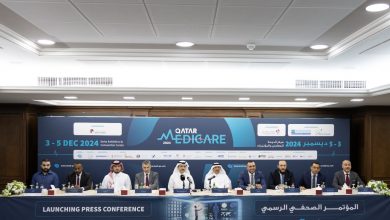
NHRC calls for more awareness campaigns to protect workers
حقوق الإنسان تحثّ على مزيد من التوعية لحماية العمال
QNA – Doha:
The field visits and monitoring team of the National Human Rights Committee (NHRC) stressed the need for taking further awareness-raising measures and campaigns to protect workers and vulnerable groups, noting that the Committee continues to provide the Ministry of Administrative Development, Labour and Social Affairs (MADLSA) with cases and complaints received by the NHRC under the current circumstances in order to resolve it.
This came as a continuation of the series of meetings and field visits that the NHRC has undertaken to penal institutions, detention centers, police stations, the industrial area, workers’ accommodations and hotel guests who are under quarantine as part of the precautionary measures approved by authorities to contain the spread of the coronavirus.
Vice Chairman of the NHRC Dr Mohammed bin Saif Al Kuwari confirmed in a press statement that the NHRC’s field visits and monitoring team have met with officials of the Labour Relations Department at MADLSA with the aim of familiarizing with the ministry’s measures and procedures regarding protecting workers’ rights in light of the current health crisis.
Dr. Al Kuwari noted that officials of the ministry provided an overview of the measures taken by the them regarding workers’ rights and payment of wages during the coronavirus crisis, as well as the awareness campaign launched by the ministry, including carrying out nearly 2,400 field visits targeting approximately 160,000 workers.
He added that the ministry has instructed companies to adopt a number of measures, which include exchanging information to increase workers ‘awareness and taking into account personal hygiene, restricting assembly to a minimum and reducing housing density, whether in housing or work sites.
Other measures to be taken includes the role of the Occupational Safety and Health Supervisor defined by the policy on the procedures applied by companies to take advantage of clinics and conduct check ups for workers to ensure their safety and to reduce their bus capacity to 50 percent, as well as reiterating that the Ministry will monitor the companies’ compliance with this policy.
Concerning the facilities offered to workers and the regulations used to facilitate the transfer of their salaries and money in light of the precautionary measures taken by the State, officials indicated that the Labour Ministry coordinated with the Qatar Central Bank (QCB) in this regard due to the precautionary measures and the closure of money exchanges, by facilitating the procedures and providing applications for financial transfers. In addition, the ministry conducted awareness campaigns directly and through the ministry’s social media, on how to use those applications, for both workers and employers.
They also reaffirmed that the payment of wages for workers, whether they are in quarantine or isolated, will continue based on instructions issued by the Labour Ministry.
They have setup a hotline number – 40280660 – to report any work-related violations. The worker can submit any grievance through the ‘Labour Complaints Service’ by sending text message to 92727, which is available throughout the day in several languages, and is decided upon immediately.
At the end of the meeting, the NHRC team urged to refer cases that are difficult to settle amicably to the Labour Dispute Resolution Committee and to settle them via electronic means, while intensifying instructions and awareness in the Industrial Area. There should also be follow-up to complaints submitted and follow-up agreements between the employer and workers, so that there is no abuse by the employer. The NHRC stressed the need for continuous cooperation between NHRC and the MADLSA, especially in light of the current circumstances.
On the other hand, in their meeting with MOPH, the NHRC team reviewed the precautionary measures and health services provided by the health institutions to combat the outbreak of Coronavirus (COVID-19), and monitor the conditions and rights of citizens and residents, especially those who are vulnerable, such as elderly, people with disabilities or chronic diseases, workers and those with low-income, in accordance with the international laws, agreements and covenants of human rights.
Dr. Mohammad Saif Al Kuwari, said that the meeting came to determine the extent of providing health care and improving the people’s health, especially those who are vulnerable, in implementation of Article 3/10 of Decree Law No. 17 of 2010.
The Ministry officials explained that based on the State of Qatar’s interest in the health of all its residents, a plan was developed to prepare and be ready to fight COVID-19 and to take all measures and precautions that need to be taken in such framework.
They also noted that the MOPH’s strategy is based on several pillars that include sharing awareness with the community, as well as doing tests and searching for the individuals that could possibly be transmitting in the community, and providing a sufficient amount of beds for the new cases, pointing out that five hospitals have been designated to treat the people who are positive. According to the instructions of MADLSA, the total number of beds would be 14,000, they added.
They stressed that hospitals provide the highest standards of care and attention for the patients and that the MOPH has made proactive measures in cooperation with the Ministry of Municipality and Environment and the Public Works Authority (Ashghal), regarding cleaning and sanitizing of the Industrial Area, from street no. 1 to street no. 32, within joint efforts to reduce the spread of the virus.
In accordance with the standards of MOPH, field hospitals were provided and quarantine and medical isolation units were equipped in record time, besides activating a number of distance health services; to facilitate reaching medical care, in the Primary Health Care Corporation and Hamad Medical Corporation, in cooperation with “Tasmu Smart Qatar” programme, as well as the Ministry of Transport and Communication, Qatar e-Governmental Portal (Hukoomi) and Qatar Post.
At the end of the meeting, the MHRC team made a number of recommendations that included the emphasis that health services are to be provided for all who live in Qatar, whether citizens or residents.
In a related context, the team also called for the necessity to ensure that the precautionary measures and health services provided include everyone who lives in Qatar, and to pay attention to the more vulnerable individuals, especially the elderly, and those with disabilities, as well as those with chronic diseases, pregnant women, worker and those with low-income.
الدوحة – قنا:
أكّد فريق الزيارات والرصد باللجنة الوطنية لحقوق الإنسان ضرورة اتخاذ مزيد من الإجراءات والحملات التوعوية اللازمة لحماية العمال والفئات الضعيفة، منوهاً باستمرار اللجنة في تزويد وزارة التنمية الإدارية والعمل والشؤون الاجتماعية بالحالات والشكاوى التي ترد للجنة الوطنية، في ظل الظروف الراهنة، للعمل على حلّها. كما أكّد فريق الزيارات والرصد، خلال لقائه مسؤولين بوزارة الصحة العامة، ضرورة بذل مزيد من الجهود لتوفير الخدمات الصحية اللازمة والحق في العلاج والدواء لكل المواطنين والمقيمين في قطر، على حد سواء، لا سيّما الفئات الضعيفة، مثل المسنين، وذوي الإعاقة، وأصحاب الأمراض المزمنة، والعمال، وذوي الدخل المحدود، في ظل تفشي فيروس كورونا «كوفيد – 19».
جاء ذلك استمراراً لسلسلة اللقاءات والزيارات الميدانية التي قامت بها اللجنة الوطنية لحقوق الإنسان إلى المؤسسات العقابية ومراكز الاحتجاز، ومراكز الشرطة، والمنطقة الصناعية، وأماكن إقامة العمال ونزلاء الفنادق الموجودين قيد الحجر الصحي، لأجل الوقوف على تنفيذ الإجراءات الاحترازية التي أقرتها السلطات الرسمية لاحتواء تفشي فيروس كورونا «كوفيد – 19».
«التنمية الإدارية» وجّهت بتنفيذ إجراءات لحماية العمال
وفي تصريح صحافي، أكّد الدكتور محمد سيف الكواري، نائب رئيس اللجنة الوطنية لحقوق الإنسان، أن «لقاء لجنة الزيارات والرصد باللجنة مع مسؤولين بوزارة التنمية الإدارية والعمل والشؤون الاجتماعية «إدارة علاقات العمل» جاء بهدف الاطلاع على تدابير وإجراءات الوزارة بشأن حماية حقوق العمال، في ظل الأزمة الصحية الراهنة، ومدى تمتّعهم بحقوقهم الواردة في القوانين والاتفاقيات والمواثيق الدولية المتعلقة بحقوق الإنسان».
ونوّه الدكتور الكواري رئيس لجنة الزيارات والرصد بأن المسؤولين بوزارة التنمية الإدارية والعمل والشؤون الاجتماعية قدموا لمحة عن الإجراءات التي اتخذتها الوزارة بشأن حقوق العمال ودفع أجورهم خلال أزمة فيروس كورونا المستجد «كوفيد – 19»، ومن بينها حملة «واعي» التي أطلقتها الوزارة، ونفذت ما يقارب 2400 زيارة ميدانية، استهدفت 160 ألف عامل تقريباً. وأضاف أن مسؤولي الوزارة أشاروا إلى أنها «أصدرت جملة من الإجراءات الواجب اتخاذها من قبل الشركات، والتي تشمل تبادل المعلومات لزيادة وعي العمال ومراعاة النظافة الشخصية، وحصر التجمع بالحد الأدنى، وتخفيض الكثافة السكنية، سواء في السكن أو مواقع العمل، إضافة لدور مشرف السلامة والصحة المهنية الذي حدّدته السياسة الخاصة بالإجراءات التي تطبقها الشركات للاستفادة من العيادات، وإجراء الفحوصات للعمال للتأكد من سلامتهم، وتخفيض السعة الاستيعابية لحافلاتهم إلى 50 بالمئة، فضلاً عن التأكيد مجدداً بأن إدارة تفتيش العمل بالوزارة ستراقب مدى التزام الشركات بهذه السياسة».
وبشأن التسهيلات المقدمة للعمال، والأنظمة المتّبعة لتسهيل تحويل رواتبهم وأموالهم، في ظل الإجراءات الاحترازية التي تتخذها الدولة، أوضح أن المسؤولون أكدوا أن «وزارة التنمية الإدارية والعمل والشؤون الاجتماعية نسّقت مع مصرف قطر المركزي بهذا الشأن، نظراً للإجراءات الاحترازية، وإغلاق محلات الصرافة، وذلك بتسهيل الإجراءات عبر توفير تطبيقات للتحويلات المالية، بالإضافة للتطبيقات الموجودة حالياً بالدولة، وكذلك إقامة حملات توعوية مباشرة، وعبر وسائل التواصل الاجتماعي التابعة للوزارة، حول آلية استخدام تلك التطبيقات، سواء للعمال أو صاحب العمل».
كما جددوا التأكيد على أن دفع أجور العاملين، سواء الموجودين في الحجر، أو الذين تم عزلهم سيستمر «بناءً على التعليمات التي أصدرتها وزارة التنمية الإدارية والعمل والشؤون الاجتماعية».
وأشاروا أيضاً إلى تخصيص الخط الساخن رقم 40280660 للإبلاغ عن أية مخالفات متعلقة بقطاع العمل، بينما يمكن للعامل تقديم أي شكوى عمالية من خلال خدمة الشكاوى العمالية، عبر الرسائل النصية، والمتوفرة على مدار اليوم بعدة لغات، ويتم البت بشأنها على الفور، عن طريق إرسال رسالة نصية إلى الرقم 92727.
وفي ختام الاجتماع، دعا فريق الزيارات والرصد باللجنة الوطنية لحقوق الإنسان إلى أن تقوم الإدارة بإحالة الحالات التي يصعب فضّها ودياً إلى لجنة فض المنازعات، وأن يتم الفصل فيها عبر الوسائل الإلكترونية، مع تكثيف الإرشادات والتوعية في المنطقة الصناعية. كما ينبغي أن تكون هناك متابعة للشكاوى المقدمة ومتابعة الاتفاقات بين صاحب العمل والعمال، حتى لا يحدث تعسّف من قبل جهة العمل. وأكّدت اللجنة الوطنية لحقوق الإنسان ضرورة التعاون المستمر بينها وبين وزارة التنمية الإدارية والعمل والشؤون الاجتماعية، خاصة في ظل الظروف الراهنة.
«الصحة»: الإجراءات الاحترازية جزء من الاستراتيجية الشاملة
اطّلع فريق الزيارات والرصد باللجنة الوطنية لحقوق الإنسان -لدى لقائه مسؤولين بوزارة الصحة العامة- على الإجراءات الاحترازية والخدمات الصحية التي قدّمتها المؤسسات الصحية لمواجهة تفشّي فيروس كورونا «كوفيد – 19»، ورصد أوضاع وحقوق المواطنين والمقيمين، وبخاصة الفئات الضعيفة، مثل المسنّين وذوي الإعاقة وأصحاب الأمراض المزمنة، والعمال، وذوي الدخل المحدود طبقاً للقوانين والاتفاقيات والمواثيق الدولية المتعلقة بحقوق الإنسان.
وقال الدكتور محمد سيف الكواري، نائب رئيس اللجنة الوطنية لحقوق الإنسان: «إن اللقاء جاء لأجل الوقوف على مدى توفير الرعاية الصحية وتعزيز صحة السكان، لا سيّما الفئات الضعيفة، وذلك تنفيذاً لنص المادة (3/10) من المرسوم بقانون رقم (17) لسنة 2010».
وأوضح أن هؤلاء المسؤولين بالوزارة أكدوا أن الإجراءات الاحترازية التي تمّ اتخاذها جاءت «تنفيذاً للإجراءات الوقائية الصحية التي اتخذتها السلطات الرسمية لتفادي انتقال فيروس (كورونا) داخل المجتمع، وكجزء من الاستراتيجية الشاملة التي تهتم بصحة السكان من مواطنين ومقيمين على قدر المساواة».
كما أوضحوا أنه «انطلاقاً من اهتمام دولة قطر بصحة سكانها كافة، تم وضع خطة للاستعداد والجاهزية للتصدي لفيروس (كورونا)، واتخاذ جميع الإجراءات والتدابير والاحترازات التي يتم اتخاذها في هذا الإطار».
وأشاروا أيضاً إلى أن «استراتيجية وزارة الصحة العامة تقوم على عدة ركائز، تشمل توعية المجتمع، وإجراء الفحوصات والبحث عن السلاسل الانتقالية في المجتمع، وتوفير أسرّة كافية لاستقبال الحالات»، لافتين في هذا السياق إلى أنه قد تم تخصيص 5 مستشفيات لعلاج المصابين بفيروس كورونا المستجد «كوفيد – 19»، وأن العدد الإجمالي «بناءً على التعليمات التي أصدرتها وزارة التنمية الإدارية والعمل والشؤون الاجتماعية للأسرّة سيصبح 14 ألف سرير».
وشدّدوا على أن المستشفيات تقدّم أعلى معايير الرعاية والعناية للمصابين، وأن وزارة الصحة العامة قامت بجهود استباقية بالتعاون مع وزارة البلدية والبيئة، وهيئة الأشغال العامة «أشغال»، فيما يخصّ حملة تطهير المنطقة الصناعية وتعقيمها، من شارع رقم (1) إلى شارع رقم (32)، وذلك ضمن الجهود المشتركة للحدّ من انتشار الفيروس.
كما تم تجهيز مستشفيات ميدانية، وتأهيل وحدات للحجر الصحي، والعزل الطبي في وقت قياسي، وفقاً لمعايير وزارة الصحة العامة، بجانب تفعيل مجموعة من الخدمات الصحية عن بُعد لتيسير الوصول إلى الرعاية الطبية، وذلك في مؤسسة الرعاية الصحية الأولية ومؤسسة حمد الطبية، بالتعاون مع برنامج قطر الذكية «تسمو»، ووزارة المواصلات والاتصالات، وبوابة حكومة دولة قطر الإلكترونية «حكومي»، وبريد قطر، بالإضافة إلى التعاون مع عدد من مُقدّمي الحلول الرقمية البارزين.
خدمات صحية
وفي ختام اللقاء، رحّب فريق الزيارات والرصد في اللجنة الوطنية لحقوق الإنسان بالإجراءات الاحترازية الصارمة التي اتّخذتها وزارة الصحة العامة، وقدّم جملة من التوصيات تضمّنت التأكيد على تقديم خدمات صحية لكل من يعيش في قطر، مواطنين ومقيمين، وضرورة أن تكون الخدمات العامة المقدمة من قِبل الوزارة تشمل الجميع. كما دعا الفريق، في سياق متصل، إلى ضرورة الحرص على أن تشمل الإجراءات الاحترازية والخدمات الصحية المقدّمة كلّ من يعيش على أرض قطر، وضرورة إيلاء أهمية خاصة للفئات الضعيفة، لا سيّما المسنّين وذوي الإعاقة، والمرأة، والحوامل، وأصحاب الأمراض المزمنة، والعمال، وذوي الدخل المحدود. مؤكداً في الوقت نفسه استمرار التعاون المشترك بين اللجنة الوطنية لحقوق الإنسان ووزارة الصحة العامة في كل ما يتعلّق بضمان الحق في الصحة، والحق في الوصول إلى العلاج والدواء لكل المواطنين والمقيمين بالدولة.



